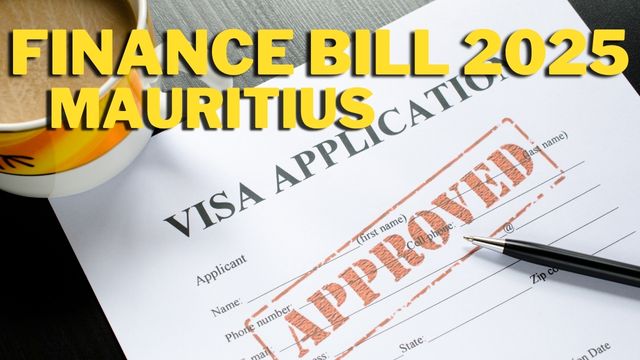The Finance Bill 2025 Mauritius introduces sweeping changes for foreign nationals seeking to live, invest, or retire on the island. Spanning 333 pages and amending nearly sixty laws, this bill is not just a financial plan, it’s a comprehensive restructuring of Mauritius’ immigration and fiscal landscape.
With higher financial thresholds, revised permit rules, and a sharper focus on attracting qualified professionals and investors, this reform aims to enhance the country’s economic resilience and public finance sustainability.
10-Year Occupation Permits: Greater Stability with Higher Expectations
One of the most notable changes in the Finance Bill 2025 Mauritius is the extension of the Occupation Permit’s validity from three years to ten years. This longer duration offers more stability for foreign professionals and entrepreneurs but comes with significantly increased financial and performance requirements. The government’s intention is clear: to attract serious, high-calibre individuals capable of contributing meaningfully to the national economy.
Investor Pathways: Two Routes, Two Investment Strategies
Foreign investors now have to choose between two structured pathways, both with clear financial benchmarks:
- Option 1 requires a minimum initial investment of $50,000, transferred within 60 days. The business must generate 1.5 million MUR in revenue in the first year and reach 20 million MUR cumulatively over five years. From year six onwards, the investor must maintain an annual turnover of 5 million MUR to renew the permit.
- Option 2, though it demands a $100,000 investment, has more accessible performance targets: only 1 million MUR turnover in year one and 15 million MUR cumulatively over five years. Annual turnover from year six must still meet the 5 million MUR requirement.
Both tracks offer a ten-year permit but are clearly designed to encourage sustained, long-term business growth.
Professionals Face New Salary Thresholds
The Finance Bill 2025 Mauritius also sets a higher bar for foreign professionals. The new ProPass requires a minimum monthly salary of 50,000 MUR, more than double the previous threshold. For elite professionals, the Expert Pass now mandates a 250,000 MUR minimum monthly income.
While these permits still allow for a ten-year stay (or the length of an employment contract), they come with new restrictions: holders can invest in local companies but are prohibited from holding a majority share in the company that employs them.
Self-Employed Professionals: Service-Only, Higher Entry Barriers
Self-employed foreigners are now limited to the service sector. The minimum investment has been raised to $50,000, up from $35,000. Required revenues are set at 750,000 MUR in the first year and a cumulative 6 million MUR over five years. From the sixth year, annual turnover must reach 1.5 million MUR to renew the permit.
Applicants must also submit at least three letters of intent, two of which must come from potential local clients—evidence of project viability is now essential.
Retirees: Accessible Entry, but with Clear Rules
Retired non-citizens continue to benefit from a tailored ten-year residence permit. They must transfer $2,000 within 60 days of approval and commit to sending $24,000 annually (or $2,000 monthly) thereafter.
They may not engage in paid employment but are allowed to invest in companies without receiving salary or social benefits. This maintains Mauritius as an appealing destination for affluent retirees while protecting the local labour market.
Family Residence and Child Age Extension
To obtain a family residence permit, foreigners must now contribute $250,000 to the COVID-19 Projects Development Fund. On the social front, dependent children are now eligible up to the age of 24, compared to the previous limit of 18, acknowledging longer periods of education.
Property Taxes to Double from July 2026
Real estate investors will face one of the most impactful changes in the Finance Bill 2025 Mauritius: a doubling of key property taxes starting 1 July 2026.
The Land Transfer Tax (LTT) will increase to 10% on the sale of residential properties by non-citizens. Simultaneously, the Registration Duty will also rise to 10% for purchases made by non-citizens. These changes apply to properties bought under schemes like the Real Estate Development Scheme, Invest Hotel Scheme, Smart City Scheme, and Property Development Scheme.
Properties purchased before 1 July 2026 will not be affected.
Permanent Residency: Rewarding Long-Term Commitment
A new 20-year Permanent Residence Permit is being introduced, but it comes with high eligibility standards based on permit category and sustained performance:
- Investors must show 15 million MUR per year for five years or 75 million MUR cumulatively.
- Professionals need to earn 400,000 MUR per month for five consecutive years.
- Self-employed must generate 3 million MUR annually or 15 million cumulatively.
- Retirees must prove $200,000 in transfers over five years.
A notable exception is made for the Mauritian Diaspora, who can qualify in 10 years instead of 20.
Social Support and New Tourist Tax
From September 2025, the Finance Bill 2025 Mauritius introduces a social income support programme for non-citizens aged 60 and over (but not yet eligible for pensions). Beneficiaries may receive 10,000 MUR/month, provided their individual income does not exceed 10,000 MUR, or 20,000 MUR for couples.
Additionally, a new tourist tax of $3 per night will be applied from October 1, 2025, affecting registered accommodation providers and indirectly impacting hotel investors.
Administrative Reform: One Platform, One Permit
In a bid to modernize, the application process for residence and work permits has been centralized via the NELS platform (National Electronic Licensing System). A joint committee including the Ministry of Finance, Passport and Immigration Office, and the EDB will oversee applications.
Work and residence permits are now combined into a single document, issued by the Director General of Immigration. Employers must also pay a non-refundable annual fee per foreign employee, though exemptions can be granted by ministerial decision.
What Lies Ahead: Opportunity vs. Challenge
The Finance Bill 2025 Mauritius sets a bold new direction in immigration and investment strategy. It favours quality over quantity—offering longer-term permits to high-performing, well-funded individuals while imposing stricter entry conditions for newcomers.
For existing or planned real estate acquisitions, timing is critical: purchasing before July 2026 avoids the upcoming tax hikes. For new applicants, careful financial and strategic planning will be key to meeting the new standards.
Mauritius is clearly redefining its foreign resident ecosystem—and those ready to meet the challenge may find themselves well rewarded.



